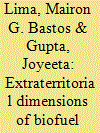|
|
|
Sort Order |
|
|
|
Items / Page
|
|
|
|
|
|
|
| Srl | Item |
| 1 |
ID:
131365


|
|
|
|
|
| Publication |
2014.
|
| Summary/Abstract |
Despite criticism, global biofuel production continues to rise, using primarily food crops. Between 2001 and 2012 it increased nearly six-fold, driven primarily by domestic policies, yet raising strong international concerns, eg over impacts on global food prices. Nevertheless, little international biofuel governance has emerged. This article examines the various extraterritorial dimensions of domestic biofuel policies and investigates why international biofuel governance has remained vague, despite its controversial nature. It uses the politics of scale to analyse why countries may wish to frame it as a global or domestic issue. Three extraterritorial dimensions are identified: global environmental impacts, global socioeconomic impacts, and attempts at extraterritorial control over biofuel production abroad. While major producers have successfully avoided liability for impacts by preventing the scaling up of much biofuel governance to the international level, major importers have tried to fill perceived governance gaps using policies aimed at extraterritorial control. We show that both the rise of nationally oriented development policies with extraterritorial impacts and of unilateral sustainability rule making primarily affect weaker countries, making global inequalities more pronounced. It is essential that adaptation governance take into account both environmental and global socioeconomic changes, such as higher agricultural commodity prices.
|
|
|
|
|
|
|
|
|
|
|
|
|
|
|
|
| 2 |
ID:
176482


|
|
|
|
|
| Summary/Abstract |
Two theoretical frameworks frame the spatial dimensions of organised crime. The first, which has shaped international responses to the problem, stresses the scalar and territorial nature of the problem; the second (and recently emerging) has drawn on network theories to suggest that organised crime is ascalar and operates through fluid relationships between people, places and things. We suggest that these viewpoints tend to bifurcate scalar and flat ontologies and argue that understanding and responding to organised crime requires engaging with theories of scale and networks simultaneously. We bring this theoretical insight to bear on a case study: we examine the way state power has shaped organised crime and responses to it across the Pacific. The case study highlights that responses to organised crime are by and large driven by scalar and state‐based responses, which have been shaped by political power. In contrast, organised crime constitutes networked relations that are significantly shaped by administrative and political scales. The paper argues that the disjuncture between the nature of responses to organised crime helps perpetuate the problem. It also highlights the advantages of greater dialogue between scalar and networked theories of organised crime.
|
|
|
|
|
|
|
|
|
|
|
|
|
|
|
|
| 3 |
ID:
111874


|
|
|
|
|
| Publication |
2012.
|
| Summary/Abstract |
Neoliberalism has become dominant in both thought and practice throughout much of the world since the early 1970s. In China, neoliberal ideas are growing fast, even as it festers and stagnates in capitalist economies. To capture this process, many scholars have extensively studied market politics in China, demonstrating how state functions are rearticulated downwards and outwards to allow local discretion and market formation. The result is a burly wave of urban entrepreneurialism, which becomes a key municipal strategy to enhance place-specific, socio-economic assets. However, such arguments neglect a counter-trend in which the state has deterritorialised and recentralised some key functions. This paper draws on two cases in urban land administration and state planning regulation to argue that state functions are being reassembled as a new post-crisis political instrument to reassert the functional importance of top-down regulatory control. Economic decentralization is now counterbalanced by the rise of state strategies to control the articulation of scales through which a more centrally consolidated power can be achieved. Rather than viewing markets as taking over the state and local territorial discretion overshadowing hierarchical administration, the paper emphasises the important role of state and top-down regulation in the current post-crisis context under transition.
|
|
|
|
|
|
|
|
|
|
|
|
|
|
|
|
|
|
|
|
|